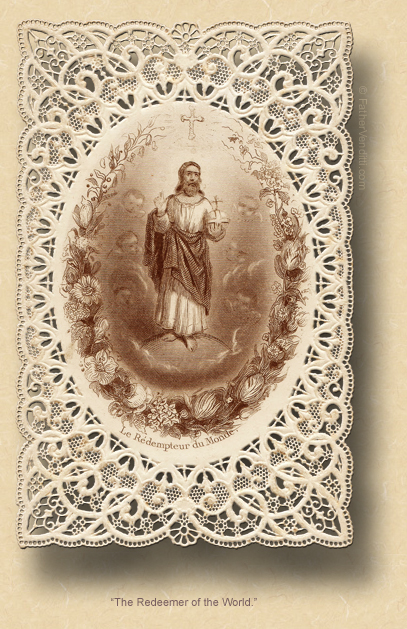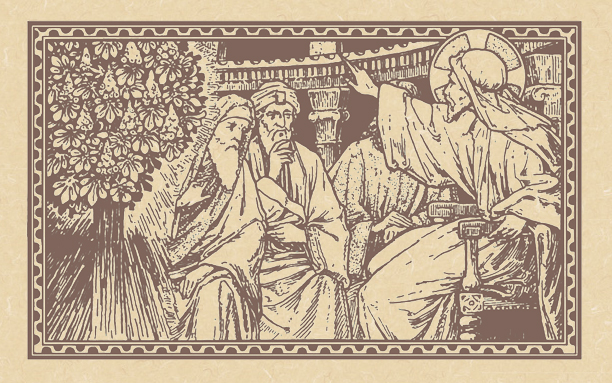Would
You Like Some Figs with Your Whine?
The
Third Sunday of Lent.
Lessons
from the tertiary dominica, according to the ordinary form of the
Roman Rite:
• Exodus 3: 1-8, 13-15.
•
Psalm 103: 1-4, 6-8, 11.
• I Corinthians 10: 1-6,
10-12.
• Luke 13: 1-9.
When
the alternate lessons from the primary dominica are taken:*
• Exodus 17: 3-7.
• Psalm 95: 1-2,
6-9.
• Romans 5: 1-2, 5-8.
• John 4: 5-42
or 5-15, 19-26, 40-42.
|
Lessons
from the dominica, according to the extraordinary form of the
Roman Rite:
• Ephesians 5: 1-9.
• Psalm
9: 20, 4.
• Psalm 122: 1-3.
• Luke 11: 14-28.
FatherVenditti.com
|
 5:25
PM 3/20/2022 — In the film Lawrence of Arabia there is a
scene where Lawrence, played by Peter O'Toole, has been summoned
to the office of his commanding general, played by Jack Hawkins,
and a reporter, played by Arthur Kennedy, asks Claude Rains'
character, “Is the man in trouble?” and Rains
responds, “I assume so. We all have troubles”; which,
of course, is not an answer, but is profoundly true. There are
very few of us who can say that our journey through this valley
of tears—as the “Hail, Holy Queen” puts it—is
a happy-go-lucky waltz through life. The temptation, of course,
is that we personalize our troubles and presume that they are
directed personally against us because of some sin or some
failure on our part, and if we could only identify it and deal
with it all our troubles would go away. Remember when our Lord
encountered the Man Born Blind, and His disciples asked him,
“'Master, was this man guilty of sin, or was it his
parents, that he should have been born blind?' 'Neither he nor
his parents were guilty,' Jesus answered; 'it was so that God’s
action might declare itself in him'” (John 9: 2-3 Knox).**
It's the same question they ask Him in today's lesson, just with
different circumstances: an uprising among the Jews in our Lord's
adopted home province of Galilee had been put down very violently
by Pilate, and some sort of construction accident in Siloam had
killed eighteen people while they were building some sort of
tower or monument at the sight of Jacob's Well; so, the
presumption of their question to Him is the same as in the case
of the Man Born Blind: what did all these unfortunate people do
to deserve all this?
5:25
PM 3/20/2022 — In the film Lawrence of Arabia there is a
scene where Lawrence, played by Peter O'Toole, has been summoned
to the office of his commanding general, played by Jack Hawkins,
and a reporter, played by Arthur Kennedy, asks Claude Rains'
character, “Is the man in trouble?” and Rains
responds, “I assume so. We all have troubles”; which,
of course, is not an answer, but is profoundly true. There are
very few of us who can say that our journey through this valley
of tears—as the “Hail, Holy Queen” puts it—is
a happy-go-lucky waltz through life. The temptation, of course,
is that we personalize our troubles and presume that they are
directed personally against us because of some sin or some
failure on our part, and if we could only identify it and deal
with it all our troubles would go away. Remember when our Lord
encountered the Man Born Blind, and His disciples asked him,
“'Master, was this man guilty of sin, or was it his
parents, that he should have been born blind?' 'Neither he nor
his parents were guilty,' Jesus answered; 'it was so that God’s
action might declare itself in him'” (John 9: 2-3 Knox).**
It's the same question they ask Him in today's lesson, just with
different circumstances: an uprising among the Jews in our Lord's
adopted home province of Galilee had been put down very violently
by Pilate, and some sort of construction accident in Siloam had
killed eighteen people while they were building some sort of
tower or monument at the sight of Jacob's Well; so, the
presumption of their question to Him is the same as in the case
of the Man Born Blind: what did all these unfortunate people do
to deserve all this?
This
presumption, of course, is an exercise in the sin of pride, and
our Lord challenges it in the first half of today's Gospel
lesson:
Do you suppose, because
this befell them, that these men were worse sinners than all else
in Galilee? I tell you it is not so; you will all perish as they
did, if you do not repent. … do you suppose that there was
a heavier account against them, than against any others who then
dwelt at Jerusalem? I tell you it was not so; you will all perish
as they did, if you do not repent (Luke 13: 2, 4-5 Knox).
In other words, while it is true that all
suffering in this earthly life is the result of sin, this does
not mean that our own sufferings are the results of our
own sins; and, I say that this is an exercise in the sin of
pride because it's based on the presumption that the negative
effects of God's permissive will are so personalized that what we
do in this life effects us and us alone, without reckoning upon
the Communion of the Saints or our participation in the effects
of Original Sin.
Life in this
world is hard, but not because of anything we've done personally,
but because of the effects of our fallen nature and the
concupiscence that goes with it. As our Lord points out, the
Galileans and the people at Siloam were punished, yes, but not
because of each of their individual sins, but because of the sins
of all Galileans and all Siloamites; and, the repentance he
exhorts upon them is a repentance that must take place within the
whole of those societies.  It
only becomes personal when we realize that the conversion of a
society is linked to the personal conversion of each and every
soul within it; and, we contribute to the conversion of society
by, first of all, converting ourselves.
It
only becomes personal when we realize that the conversion of a
society is linked to the personal conversion of each and every
soul within it; and, we contribute to the conversion of society
by, first of all, converting ourselves.
The
second half of the Gospel lesson is a parable, and a rather
simple one: the fig tree that doesn't bear fruit is cut down and
thrown away; not a lot of mental gymnastics needed to figure that
one out. But the important part of this lesson is how dangerous
it can be to become too introspective. This, also, is an exercise
in pride—and for the same reason—because it presumes
that everything that happens to me is because of me. It's an
exercise in a lack of understanding of Catholic dogma because it
denies the effects of Original Sin and our link to the Communion
of the Saints. I suffer in this world not because I am a sinner,
but because I happen to live in a sinful world. We chafe at that
because it isn't fair: why should I have to participate in the
negative effects of the sins of others? Because that's the way it
is. That's what Original Sin was all about.
We
often betray our sin of pride and our lack of understanding of
Original Sin in the manner in which we sometimes make our
confessions: we start crying to the priest about how hard our
life is and how difficult it is to cope, either because we have
mistaken the priest for some kind of psychologist or counselor,
or—which I think is more likely—we're just obsessed
with ourselves and presume that everything that's gone wrong with
our lives has to do with us; and, this prevents us from making a
truly good confession. We don't go to confession to get practical
advice on how to cope with our problems; we go to confession to
be absolved of our sins, and all the priest has to know to do
that is what we did and how many times we did it, as far as we
can remember. And I sometimes suspect that the reason so many
people wait so long to go to confession, or avoid going to
confession, is because they don't really understand what they're
supposed to do there, or what they're supposed to be there to
receive. It's purpose is not therapeutic, it's sacramental; it's
there to give Grace. Use it as some sort of free counseling
session, and it becomes nothing more than a form of therapy with
religious overtones, and the imparting of sacramental grace in
absolution suddenly seems secondary, if it's remembered at all;
we leave confession not convinced that we've been forgiven and
grace has been restored, but simply feeling better about
ourselves—a nebulous benefit at best which has absolutely
nothing whatsoever to do with eternal salvation.
While
it should be consoling to know that our problems are not directed
at us personally, the sin of pride is a persistent monster: we
all want to think that we're special, and to learn that our
personal problems have less to do with ourselves and what we've
done than they do with a fallen nature we share with everyone
else takes that away from us. The question is: do we have the
humility to accept the fact that it really isn't all about us?
Confession is a big part of
Lent, as you know; even more so during this Jubilee Year of
Mercy. So, let's make a resolution that, the next time we sit
down to make a good examination of conscience in preparation for
confession, we'll do it this time without the overtones of
self-pity, without rehashing for the priest—or even for
ourselves—what So-and-so did to tempt us to say that
uncharitable word, or what aches or pains caused us to be grumpy
and disagreeable, or how depressed and distracted we are because
of work or family problems and so we fell prey to some sin of
impurity, or whatever. “Merciful and gracious is the Lord,”
says today's Psalm, “slow to anger and abounding in
kindness” (Psalm 103: 8 RM3). His forgiveness is His gift
to us. If only we could learn to accept it without whining and
moaning about why we need it.

*
The Roman Missal Third Edition provides the option of always
reading the Gospel of the Samaritan Woman and its associated
lessons on this Sunday as provided in the primary dominica; when
done so, a Preface to the Canon proper to it is also used. This
homily is based on the lessons from the tertiary dominica.
**
The footnote provided by Msgr. Knox is worth repeating: “The
disciples may not have known that the man was born blind; and
[the] Greek may be interpreted as meaning, 'Did this man sin (and
go blind)? Or did his parents commit some sin, with the
consequence that he was born blind?'”
|

